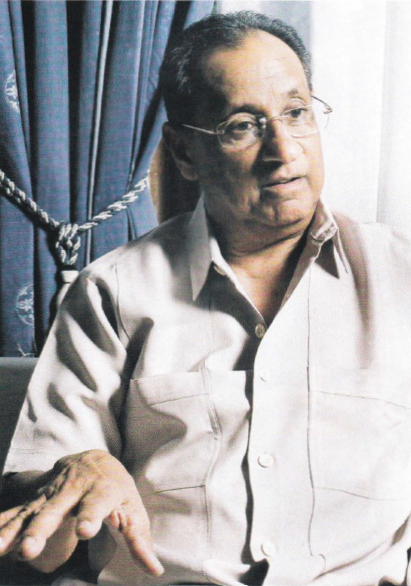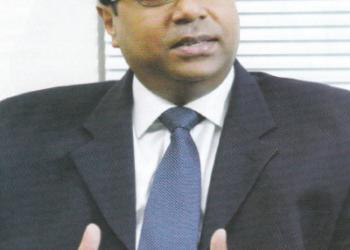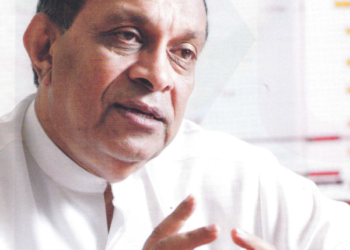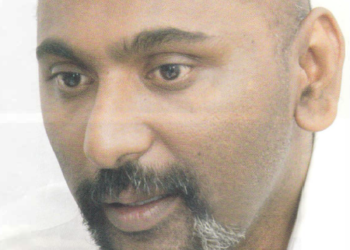A psychiatrist by profession, Professor Dr David N Ratnavale continues to have a keen interest in the field of human disaster management. Business Today met with this well-known specialist to learn about some of his views with regard to the tsunami disaster that ravaged parts of Asia in December last year.
By Rashmini Mather
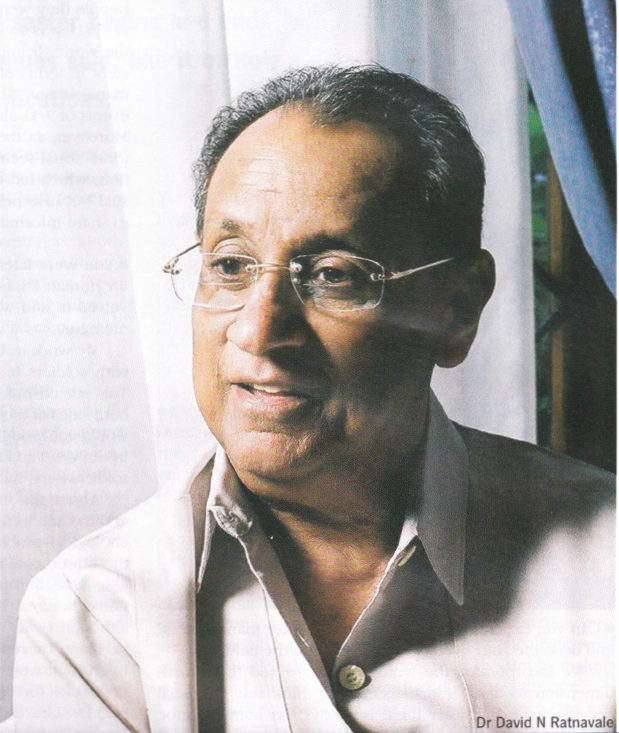
Can you begin by giving us an overview of your educational background and your interest in the subject of human disaster management?
I come from a medical family. My father was one of the first psychiatrists in South Asia and in 1937 he founded the Rotherfield Psychological Society. In some respects he was a pioneer in psychiatry. I graduated as a doctor from Sri Lanka, practiced for some year and then proceeded to the US. I have specialist qualification in psychiatry from the US and the UK, and because of my work in China. I hold a professor position in a Shanghai university.
Disasters take place daily on a personal level affecting not only the individual but their families and whoever else they are connected to and is dependent upon. As a psychiatrist, I realized that the tremendous impact of someone with a mental ailment or disorder can have on others. Looking at it from a larger perspective, when there is a national disaster as Sri Lanka has just experienced with the tsunami, society as a whole feels distressed and traumatized. My interest nowadays has been on the subject of collective trauma – community distress – and how communities heal themselves and the management of a disaster, human-induced or natural. I continue to practice as a psychiatrist in Washington, USA, and I serve as a consultant in human disaster management in many settings and of late my name has become associated with this field, although I don’t think people feel I myself am a disaster!
Can you explain this term ‘human disaster management’ and describe your overseas experience in the field?
We incorporated the word ‘human’ to add the human dimension to disaster management. I think this is crucial because in any disaster there is always the human factor. Every brick in a house, temple, church or school has been laid by a human and one’s emotional attachment to land is very strong. There is no point in separating the physical aspects of a disaster from the fact that it has an impact on the human being. In 1973 I went to China, this was the time of the Cultural Revolution when the country’s administration was in considerable disarray. What impressed me very much was the barefoot doctor movement that was established for training ordinary folk and teachers, so-called peasants, in public health measures in order to solve the problem of a shortage of doctors. I worked with these remarkable people. This example can be useful for Sri Lanka where we currently have a shortage of qualified personnel for medical assistance. When there is a need we have to rely on the nation’s natural wealth. At the present time we’re depending heavily on ordinary folks and they are doing a remarkable job. Whether we’re doctors or not, all of us have a healing capacity as humans. Soon after the Cambodian crisis in the 1990s, I traveled to Thailand and the bordering areas as the head of a US task force where Vietnamese refugees. I went into one camp where there were 98,000 refugees; most of them had traveled across the hills of Cambodia and were traumatized and starving. 1o sooner they entered the camp, the first search, interestingly, was not for food but for families and people they were connected to. 9/11 was an eye opener for the as well as the rest of the world. In many respects, I would say the US was deficient in terms of understanding certain aspects of disaster management. The country was far from prepared for the events of 9/11 although they did in fact have some warning. Moreover, as there were 15 different agencies responsible for national security in the US, they failed to share information, which led to a lack of coordination. This is not unusual because people in high places are relatively reluctant to share information. Information is power.
You were later appointed to the Presidential Task Force on Human Disaster Management. What work were you involved in and was the action plan you put forward implemented?
My work in US military hospitals brought me in contact with soldiers traumatized as a result of the Vietnam War. This stirred my interest in the problems of the soldiers of both sides of the conflict in Sri Lanka and I realized that they would go through the same psychological problems as those in the US. Thus I began to conduct some work with the exsoldiers here, including those who were physically disabled.
About this time, the President heard of my presence and met me to discuss the possibility of examining the psychological problems the country was facing as a result of the ethnic conflict and to determine the vulnerable problems. She then persuaded me to head the Presidential Task Force National Plan on Human Disaster Management and although I was reluctant at first to make such a huge commitment, I accepted and found it to be very challenging and interesting work. Interestingly, the majority of the members of my task force, including people like General Dudley Perera, Dr Tara de Mel, Jeevan Thiagarajah, Dr Hiranthi Wijemanne and Mr Lankanesan and others, seem to be still involved in humanitarian-related work. It was a struggle to collect accurate data particularly because of the existing ‘cleared’ and ‘uncleared’ areas. Regardless, we drew up an action plan in which there were chapters focused on issues such as crisis management and the vulnerable populations, which were identified as women, children and the disabled. In fact I noted in the action plan, almost like a grave prophesy, that if a natural disaster strikes, affecting both the ‘cleared’ and ‘uncleared’ areas, it would call for renewed cooperation (see box). In our work in the task force. a small team traveled to South Africa to learn about how they handled their racial conflict. I also invited a team of doctors from South Africa to Sri Lanka to discuss how they coped in their work with the switch from a time of apartheid to non-apartheid. Regrettably, the action plan was yet to be completely implemented. My work was terminated somewhat prematurely as I was told that it was due to insufficient funds for the project. Regardless I felt it was my duty to write a report on behalf of the Human Disaster Management Council, which was given to both the government at that time, the UNP, and the President. The Council was expected to follow through on my recommendations.
“Studies have shown that a disaster begins and ends as a local issue and more importantly, as one of my colleagues said, like it or not, a disaster is a political event and there will be political ramifications.”
With your extensive knowledge in disaster management, you would be an asset during the rebuilding process. Are you currently involved in any of the new task forces or drawing up national plans?
No. The President knows I am in the country, as do others who I have been working with over the years. Although I have no formal position as advisor to the President, if ever I come across valuable information on disaster management, I felt it my duty to pass it on to the President, which I have done.
You mentioned that in the case of dealing with 9/11, the large number of agencies in the US posed an obstacle because of their Jack of communication. This situation is somewhat replicated in Sri Lanka because we have a large number of ministries and several task forces to rebuild the nation?
That is a grave problem – a serious wake up call. Ir is important for the ministries to work in a spirit of cooperation rather than competition, placing the nation’s interest first. Bur you’re right, too much authoritarianism is not beneficial. Favoritism too could enter the picture. I don’t envy the people given the job. But I feel it would be helpful to draw more people in a private capacity, such as from the business community and numerous talented and capable professionals in the country, who would be helpful and for whom belonging to any political party would be of no significance. I think the international community should play a more active role, for instance with the monitoring of aid distribution and use.
Post-tsunami, there has been criticism leveled on the government’s national strategy of relief and reconstruction. What is your opinion?
Studies have shown that a disaster begins and ends as a local issue and more importantly, as one of my colleagues said, like it or not a disaster is a political event and there will be political ramifications. There is a lot of criticism I know of what is happening, and people are getting angry and focusing on what should have been done. I see this as a symptom of societal distress and it is inevitable and evident wherever disaster strikes. The secret is not to provoke more distress, which could easily happen. People are known to exploit the difficulties of others for their own benefit. I hope the leadership will prevent this from occurring and it looks like they’re doing what is required. However, I’m not sure if the on the government are accurate or justified. Governments are going to be criticized regardless. But I hope the government will capitalize on the good will extended to them by different quarter and fight the politics that is attempting to divide it. This is a huge disaster and I admire those who are helping in the relief efforts.
A natural disaster helps us to realize that we’re all mortal and that some of our petty squabbles amount to little. Yet it could also create concerns when certain previously neglected issues become highlighted. For example, when we were discussing the special attention required by the disabled soldiers during my work, the ordinary disabled citizens rightfully protested, saying that they’ve been disabled for so long, bur no one cared for them. In the case of the tsunami also, it has highlighted the plight of the poor and the needs of the refugees of the ethnic conflict and deficiencies in disaster management. This can be useful.
It appears that the focus is all about repairing of damaged infrastructure and not much attention has been given to the psychological trauma endured by the tsunami survivors. What are some of the pressing issues that should be looked at?
An immediate problem in a disaster is the presence of spontaneous volunteers and curious onlookers. Experience has shown that as well-meaning and brilliant as they may be in their respective professions, these people can present a major logistical problem diverting resources from their primary response mission, adding to confusion at the scene, and potentially endangering the safety and effectiveness of other professionals. Another concern is the troublemakers who spread rumors and cause disruption post disaster.
In most countries, there are professionals known as first responders. They are psychologically prepared to deal with the trauma and trained to deal with difficult tasks such as collecting dead bodies. After the tsunami, ordinary people were picking up and burying the bodies of their relatives, neighbors and friends. I worry about those folks because they were nor trained for such tasks and may be severely traumatized as a result. Even the trained are known to have psychological problems years later. Another danger is that inexperienced people may wrongly diagnose a person’s distress and offer medication to affected people with the risk of creating dependency on drugs, which can easily happen to relieve people of their discomfort.
In a war or act of terrorism. We can find someone of some source at which to vent out anger. This could be a form of relief instead of locking one’s anger, hare and resentment. As a release mechanism, anger should not develop into destructive or vengeful. In a natural disaster, there is no one to direct your anger towards, except for God or Karma or some supernatural force. This is an issue that counselors should examine seriously because people’s anger may manifest in different violent ways, which can be harmful to the community. In addition, involving the faith community is using one of the most significant natural healing systems.
In my own research, I have found that in the post-disaster phase, there is increased violence aimed at women. We’re not sure of the exact reasons why women become the recipients of such hostility; perhaps because they are perceived as generally weaker and the ones who are easily blamed or beat up. The situation can be alleviated by educating the community about these potential tendencies so that the religious community leaders and ordinary citizens can be watchful. I understand that currently there are people running counseling programs for the affected communities. I know the President has stated that trauma counseling is going to be high on her priorities and I am sure she will deliver on that.
Millions of dollars worth of aid has been pledged to Sri Lanka. Yet aid could be counterproductive unless good planning and governance is followed. Do you agree?
Yes, studies conducted even on people who have won multi-million dollar lotteries show that they squander the money and rarely benefit from their luck. With any of us, if we are overloaded, whether it is with money, food or information, we will find it difficult to manage the resource. At present, there is much love and compassion as everyone is pouring out their hearts, wanting to be useful. However, like it or not, compassion fatigue will set in for many, whether it is with the local volunteers, aid workers from abroad or donor countries. The donors might transfer the promised funds if we do not get our act together or if they detect their efforts being thwarted. I think we should be deeply grateful for any help we receive from other countries. I hear people complaining about the foreign workers, saying they won’t understand what is going on or they won’t realize the true needs of the local people. I think this is unfair. I am for getting help from anybody for I think most people who choose to come here to help this country has their hearts in the right place. Furthermore, the problems that the tsunami has highlighted will not go away in a few weeks. The government has to look at the long-term sustainability of the relief efforts. For instance, volunteers and counselors who will need to continue working will have to be paid; if they’re not skilled enough, ongoing training should take place. Another important element is that people tend to be amnesic about painful events of the past so the subject will recede. Gradually, the Asian tsunami will be featured less in the media and the cameras will focus on some new disaster.
With the possibility that the LTTE could become involved in the national relief and reconstruction efforts, how do you think the peace process can move forward?
Everyone is saying that this is an opportunity for the peace process to be facilitated. This is a fantastic opportunity for sharing information. When I was conducting work on disability. we learned that the LTTE had developed tremendous skills in handling people with physical disability, and had invented a variety of appliances to help their disabled. Thus we can learn a lot from everyone. It would have been helpful if disaster management experts from the LTTE were included in the newly appointed task forces. After all, if they are included as fellow citizens in the national relief efforts, it should facilitate the peace process. The tsunami has brought out an increased level of nationalism because it has affected all parts of Sri Lanka. One of the reasons the Western world has supported us is, besides genuine sympathy for our plight, because many of their citizens were also affected. There were people from 60 different countries affected by the tsunami in this region. It has helped in adding to international compassion for Sri Lanka.
A massive tsunami as was experienced last year is a somewhat uncommon phenomenon. But Sri Lanka does have the threat of cyclones. How can we be more prepared?
Nobody wants to look trouble in the face. It is human nature to always think it is not going to happen again. After all, if you’re pessimistic and focused on what’s going to happen, you’ll not be very popular. But on the other hand, you have to be realistic and prepared. The secret is to anticipate disasters and that’s where we need more science and most essentially, coordination and cooperation between all factions. It is not the job of one person; it requires several people, cooperation, and I would say, more than anything else, you need research on what has happened previously and what can happen in the future. Another important element is practice. There should be mock trials so that people are aware of what could happen and how to handle the situation. During my discussions with the President, it was planned to establish a command center gathering early warning signs and information to be used effectively. To give a simple example, if there was a possible cyclone building up as strong winds on some coastline. The center would communicate with the police and the government agent in the respective district cautioning fishermen against going out to sea and closing schools as needed for a particular period. This is a practical mechanism that employs common sense but will certainly save lives. We should also look at securing disaster management assistance from our neighboring countries like Bangladesh. As a result of facing disasters such as cyclones and floods on a regular basis, they have developed, with the assistance of Western countries. advanced disaster warning systems and management techniques. Let us remember that when one is planning post-disaster assistance, you must obtain the input of the people who were in the disaster or those living in disaster-prone areas. You cannot decide what is the best plan for a place such as Hikkaduwa from an office in Colombo. Disaster planning has to take the views of the local people.
